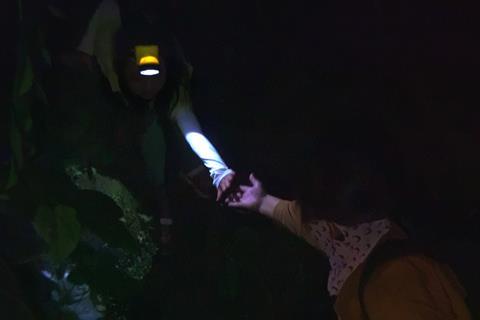The desperate stories of North Koreans trying to defect - and the South Korean pastor who helps them

Dir. Madeleine Gavin. US. 2022. 116 mins.
It’s interesting to note that while the Sundance Film Festival website talks about this film being set in ‘one of the most oppressive places on Earth’, it never once mentions North Korea by name. Beyond Utopia is a gripping, moving, sweatily tense documentary that prises open the hidden fiefdom of Kim Jong-un through the misfortunate citizens fighting for their lives trying to escape it. Anxiety must be running high in Park City and beyond given how Sony was hacked when it dared to release a comedy gently mocking the dictator - this is a castigation. Anxiety, though, is an appropriate response to this nerve-shredding piece of work.
Pastor Kim is relying on a network, his ‘underground railroad’ which is shaky and susceptible to collapse
Beyond Utopia is as tense, with equally as high personal stakes, as last year’s Navalny, which premiered in the same Sundance slot (both won audience prizes in their US Documentary section). It is much less formally composed. Anything could happen as Madeleine Gavin follows people who shouldn’t be on camera to places they shouldn’t be - the jungles of Vietnam and Laos at night, for example, or the living room of a North Korean defector anxiously trying to bring her teenage son to Seoul. Gavin doesn’t just edit and direct but lives this experience as South Korean Pastor Kim devotes himself publicly to helping North Koreans escape. There’s a religious, missionary element to Beyond Utopia which some may find offputting - its penniless subjects have to pay off so-called brokers every inch of their perilous route, financed by the church - but the curious will flock to see this film. Publicity could be dangerously hot and heavy for buyers who step up.
The world doesn’t see much of North Korea: it’s hermetically-sealed off. Its occupants are taught that the country is a paradise on earth; the rest of the world hears of nuclear tests and famines and occasionally gets a glimpse of staggeringly large-scale nationalistic ceremonies. Visitors to Pyonyang are closely watched. Mobile phones don’t work there. Pastor Kim has smuggled out footage, however, which shows desolate deprivation amid medieval agricultural farming methods. Gavin layers on historical and geographical context, which is necessary: defecting North Koreans are sent back from China if caught, for example, and have to take a circuitous secret route across that country and down through Vietnam and Laos before arriving in Thailand. Her film explains why. It also casts a light on the problem with religion in the world’s only Communist, Confucian, hereditary dictatorship. It’s complicated by the fact that Kim and his father and grandfather have appropriated the story of the Bible as their own dynastic mythology. No surprises as to who is God or Jesus in the North Korean origin story, but they’d rather their subjects didn’t realise where the source material comes from.
Pastor Kim, a very brave man long before he shows his face to the camera, has devoted his life to helping people escape from North Korea - 10,000 by his counting, in the decade since his son died. He even got his wife through. The Yalu River is the easiest crossing point to the Changbai mountains (Pastor Kim broke his neck there once), but that’s only the beginning - there’s a high reward on every defector’s head for anyone who turns them in as they traverse through China and they’re dependent on middle-men every step of the way. If they go back they’ll be beaten, tortured, set to a Gulag, and perhaps killed — there’s some chilling footage of public executions - but if they escape, their families will be targeted and ruined.
Gavin hones in on two cases. The first is Soyeon Lee, a defector now living in Seoul and separated from her child a decade ago. How this came to happen is shown through an elegantly-rendered rotoscope-like animation. Initially poised and composed as she makes plans to bring the 17 year-old boy across the border, she - and we - become increasingly devastated as this sad story takes its twists and turns. Then we have the Roh family, related to a defector called Hyukchang, who have made a run for it with only the clothes on their backs - mum, dad, two children, and 80 year-old granny who believes that Americans want to kill her, making her realtionship with the non-Korean-speaking Gavin a little tricky. They call Pastor Lee from the Changbai Mountains, wet and crying: help us. But Pastor Kim is relying on a network, his ‘underground railroad’ which is shaky and susceptible to collapse.
Madeline Gavin, whose last film City of Joy was made in the Democratic Republic of Congo, has done an exceptional job in pulling the disparate pieces of this film together. Multiple brokers have snuck out mobile phone footage, and where she can’t go, Pastor Kim takes the camera for her. They’ve built an alliance, Gavin and Pastor Kim and a defector called Hyeonseo Lee, who has written a book about her experiences also provides context and commentary. But it’s a dangerous one for him, and for all the others who show their faces to the screen, and it could be for her too. This is a film you haven’t seen before from a place you’ll never visit, a first-class example of bravery and reportage melding into an filmed testament. It’s not just that it’s nailbiting. The unease lingers long after viewing, for every person associated with it.
Production companies: Ideal Partners
International sales: Submarine, josh@submarine.com
Producers: Jena Edelbaum, Rachel Cohen, Sue Mi Terry
Editing: Madeleine Gavin
Music: Adam Taylor






![The Brightest SunScreen[Courtesy HKIFF]](https://d1nslcd7m2225b.cloudfront.net/Pictures/274x183/3/5/0/1448350_thebrightestsunscreencourtesyhkiff_312678.jpg)













![The Brightest SunScreen[Courtesy HKIFF]](https://d1nslcd7m2225b.cloudfront.net/Pictures/100x67/3/5/0/1448350_thebrightestsunscreencourtesyhkiff_312678.jpg)



